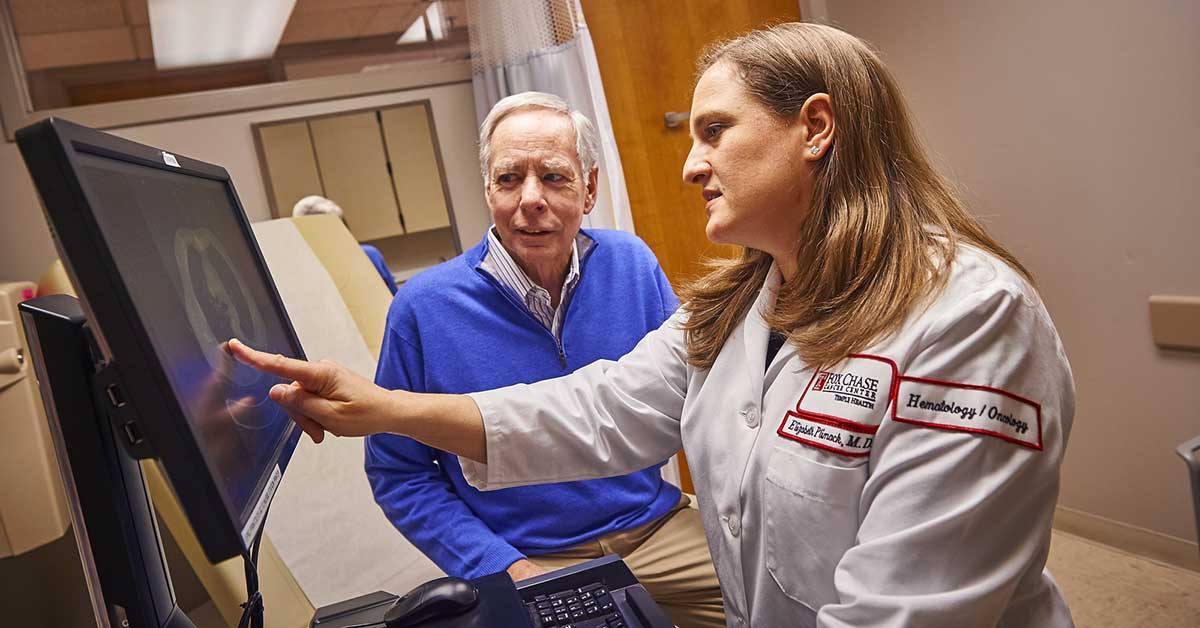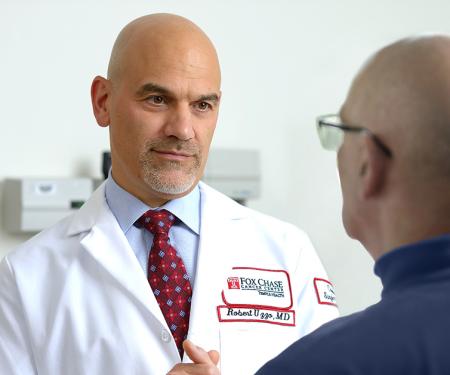
Kidneys clean the blood to filter out waste and produce urine. They also make hormones that help control blood pressure and signal for bone marrow to make red blood cells when needed.
Almost all kidney cancers are carcinomas, which start in cells that line the inner or outer surfaces of the body. In the kidneys, carcinomas most often start in the lining of the renal tubules, which remove excess water and waste from the blood to make urine. This is called renal cell carcinoma, which accounts for more than 90 percent of kidney cancer. Kidney cancer is often found before it spreads, but left undetected, it can grow and spread to other organs.
Less common types of kidney cancer include:
- Transitional cell carcinoma, which starts in the cells that line the renal pelvis
- Wilms tumors, which almost always occurs in young children (rare)
- Renal sarcoma, which starts in the blood vessels or connective tissue of the kidneys (rare)
Approximately 15–20 percent of newly diagnosed, localized kidney masses (tumors or lesions) are benign, or noncancerous. Such conditions may often look like kidney cancer when viewed with medical imaging. Fox Chase diagnostic radiologists have extensive expertise in carefully evaluating kidney masses to determine whether they are cancerous and, if so, what type of cancer they are.
Kidney Cancer Symptoms
Kidney cancer is often found incidentally through a routine medical examination or testing for another condition, and symptoms are rarely present in the early stages of the disease.
The symptoms below could be signs and symptoms of kidney cancer, especially in its later stages, but they also could be an indication of many benign conditions. We recommend you consult with your doctor if you are showing any of the following symptoms:
- Blood in the urine
- Low back pain on one side
- A mass or lump on the side or lower back
- Fatigue
- Loss of appetite
- Weight loss not caused by dieting
- Persistent fever unrelated to an infection
- Anemia (low red blood cell counts)
Risk Factors: What Causes Kidney Cancer?
Normally, the cells in our body grow and divide to make new cells as needed when old cells die. When abnormal genetic mutations occur, kidney cells can become cancer cells. These cells make new ones that aren’t needed and don’t die quickly when old or injured. As this overgrowth of cancer cells continues over time, it forms a mass called a tumor.
In most cases of cancer, researchers haven’t yet identified the exact reason behind the abnormal cell division process. However, your chances of developing kidney cancer may increase if you have the following risk factors:
- Smoking
- Obesity
- Environmental or workplace exposure to substances such as cadmium, some herbicides, and organic solvents, particularly trichloroethylene
- Genetic disorders such as von Hippel-Lindau (VHL) syndrome, hereditary leiomyomatosis and renal cell cancer (HLRCC), Birt-Hogg-Dubé (BHD) syndrome, and hereditary papillary renal cancer
- A family history of kidney cancer, particularly in siblings
- High blood pressure
- A history of taking diuretics or the non-prescription pain reliever phenacetin (banned in the U.S. by the FDA in 1983)
- Advanced kidney disease
Renal cell carcinoma is about twice as common in men as in women; men are more likely to be smokers and to be exposed to cancer-causing chemicals at work. African Americans and Native Americans/Alaska Natives have slightly higher rates of renal cell carcinoma than Caucasians, for reasons that are not certain.
Having any of these risk factors does not mean you will develop kidney cancer. Some people with kidney cancer have no risk factors. If you do develop kidney cancer, our multidisciplinary team of kidney cancer specialists will work closely with you to help determine your next steps for treatment.
Fox Chase’s Cancer Risk Assessment Program
For people at risk of developing some hereditary cancers, Fox Chase’s Department of Clinical Genetics offers education, screening and counseling services as part of its Risk Assessment Program.
Our physicians, nurses and genetic counselors help individuals and their families determine their risk of developing kidney cancer through clinical and genetic evaluation, screening and assessment. The team then offers recommendations to help reduce their cancer risk.
The Risk Assessment team also conducts research into how cancer develops, how it can be prevented, and how it can be best treated, with the goal of reducing the risk of cancer for individuals, families and communities.
If you are interested in learning more, please call Fox Chase Cancer Center’s Risk Assessment Program at 877-627-9684. The program also assesses risks for breast, ovarian, gastrointestinal, endocrine, diffuse gastric, uterine, and skin cancers.

